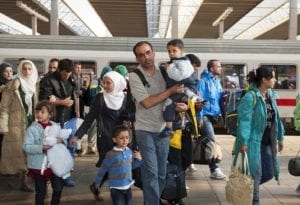 More than a million refugees crossed into Europe last year, according to reports by the BBC. Millions more are crossing into Jordan, Turkey, Lebanon and neighboring countries. This ongoing migration has been described as the “worst humanitarian crisis of our generation,” impacting nearly 60 million people globally. In war-torn Syria alone, more than 13 million children and their families are in desperate need of humanitarian assistance.
More than a million refugees crossed into Europe last year, according to reports by the BBC. Millions more are crossing into Jordan, Turkey, Lebanon and neighboring countries. This ongoing migration has been described as the “worst humanitarian crisis of our generation,” impacting nearly 60 million people globally. In war-torn Syria alone, more than 13 million children and their families are in desperate need of humanitarian assistance.
Refugees in Crisis
Late last month an image of five-year-old Syrian boy sitting in the back of an ambulance went viral. Images of boats overloaded with refugees seeking hope for a better life flooded the media last year, yet the crisis continues. In today’s election headlines, “immigration” and “refugees” are hot-button political issues that bring out either the best or worst in us.
What about the Church?
In a recent study, Ed Stezer, executive director of LifeWay Research, found that “Pastors and their congregants believe Scripture tells Christians to care for refugees and foreigners, yet many admit their church is not involved in such ministry. In fact, many pastors also say their churches are twice as likely to fear refugees as they are to help them.” However, “our God is the God who helps,” said Max Wilkins, president of The Mission Society, a faith-based ministry that exists to mobilize and deploy the body of Christ globally, “and while God doesn’t expect any of us to help everyone in need, I know that God has blessed us to be a blessing.”
You would be hard pressed to find a Christian that disagrees with Wilkins. Yet when it comes to churches helping refugees, it seems the rubber isn’t hitting the road. If God has blessed us to be a blessing to others, how does that tangibly translate to caring for today’s refugees?
Start with your neighbor
Wilkins contends that while God may not call us to change the entire world by ourselves, he clearly calls us to care for those he has placed right in front of us — even those we may not see yet. The book of Luke tells of an unnamed rich man and a poor beggar named Lazarus. In the parable, Lazarus sits outside the rich man’s gate day after day and though both men ultimately die, there is significance in the fact that the rich man knew Lazarus’s name. The rich man was aware of Lazarus’ presence and knew of his needs; he just didn’t have a category for someone unlike him and refused to help. The irony is that what Lazarus ultimately wanted was of no value to the rich man, he would have been content with what the rich man was already throwing away. It wasn’t that the rich man didn’t have the ability to do something; it’s that his careful, safe, walled-in existence did not make space for a man like Lazarus.
If we’re honest, the same can be said of you and me. We live our lives in relative comfort and often guard our time more than our checkbooks. In our routines, it’s easy to miss those who God has placed right outside the gates of our homes, offices and schools. It’s easy to develop a siege mentality as the world around us changes. In the midst of what seems like a world spun out of control, it’s easy to lose sight of who our neighbors are. Wilkins reminds us that “whether in the city or the suburbs, the reality is that our neighbors are changing. We must start by asking ourselves ‘who is my neighbor?’”
Be willing to be uncomfortable
Wilkins calls fear the 800 pound gorilla in the room. Fear of the unknown — the stranger — the “other” is the biggest roadblock to caring for the orphan, the widow, the fatherless and the refugee. However, Wilkins would prompt us to remember that “perfect love casts out all fear.” As we grow in grace and seek to love the Lord with all our heart, soul, mind and strength, we naturally grow in loving our neighbor as ourselves. “When you seek to employ the loving, biblical, response — not just as individuals but as a community — the call is not to allow what we’re clearly called to do in scripture to be derailed by fear.” To Wilkins, there is no greater tool in the enemy’s toolbox than fear.
Uncomfortable yet? I know I am. I’m happy to schedule my week, accomplish my goals and live life as comfortable as possible. But Jesus interrupts my world. He reminds me that my ultimate goal as a Christian is to know him, enjoy him, and join him in establishing his Kingdom on earth. What does that have to do with refuges? Everything.
Jesus was concerned about the redemption and restoration of humanity within the context of God’s kingdom through the gospel. Our challenge is to purse the expansion of Christ’s kingdom on earth. The growth and establishment of the early Church, as described in the books of Acts, sparked and sustained an evangelistic, missionary movement that changed the world. The fatherless found a father. The orphan found family. The stranger became known, and the refugee found a new home. Concern became compassion. Compassion became conviction and conviction led to action.
How will you respond?
Everyday thousands of refugees are moving into cities all across our country. Millions more are being resettled throughout Europe. No matter where you’d land on this issue politically, it’s clear God is moving refugees towards his people. Could it be for them to hear the Gospel?
Wilkins pointed out the hope index among refugees is near zero. However, he believes God’s people can change that. We are hardwired first responders. We are, by divine design, called to run towards brokenness, hardship and chaos. Why? Because our God turns stories of hopelessness and despair into stories of HOPE.
Maybe start with just showing up in someone’s life. Often some of the best ministry is the ministry of relationship and presence. There is power in coming alongside someone and helping them rebuild a normal life, practice their English and enjoy human connection. You don’t need a great deal of expertise to do that; anyone can invite someone to sit down at their table for dinner.
You may find that what people need most is not a can from a food pantry, a shirt you no longer wear, or a check for them to cash, but rather a connection and presence — someone to sit with — someone who knows their name and is interested in who they are.
At the end of the day, caring for refugees begins with caring for our neighbors — the people God has placed right in front of us. And like the rich man from the parable, we all have someone outside our gate.
 Edwin Copeland serves as the Director of Church United with the National Christian Foundation of South Florida where he works to unify the Church through collaboration and celebration to see faith, hope, and love spread throughout South Florida. To learn more about Church United, visit churchunited.city.
Edwin Copeland serves as the Director of Church United with the National Christian Foundation of South Florida where he works to unify the Church through collaboration and celebration to see faith, hope, and love spread throughout South Florida. To learn more about Church United, visit churchunited.city.
Read more articles by Edwin Copeland at: goodnewsfl.org/author/edwincopeland/


Comments